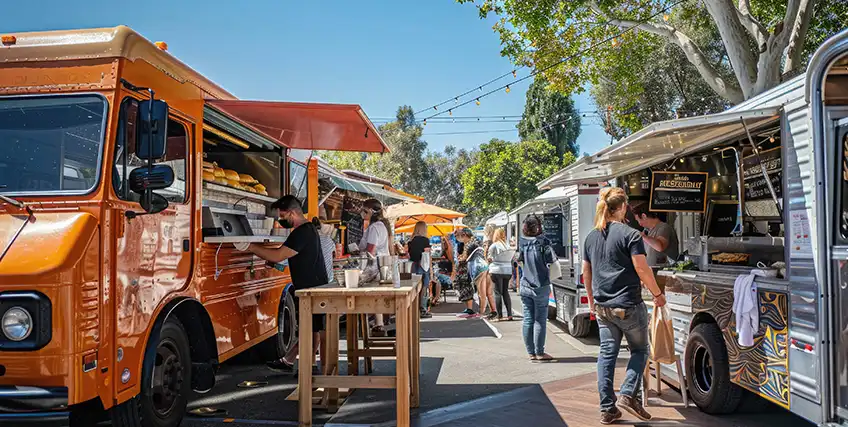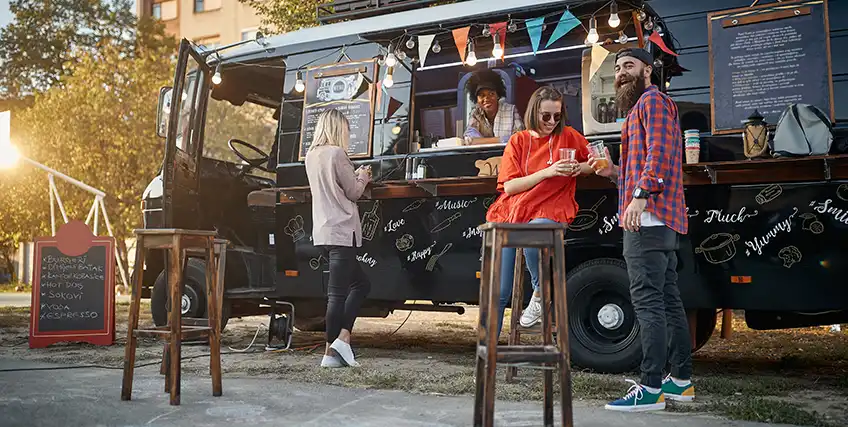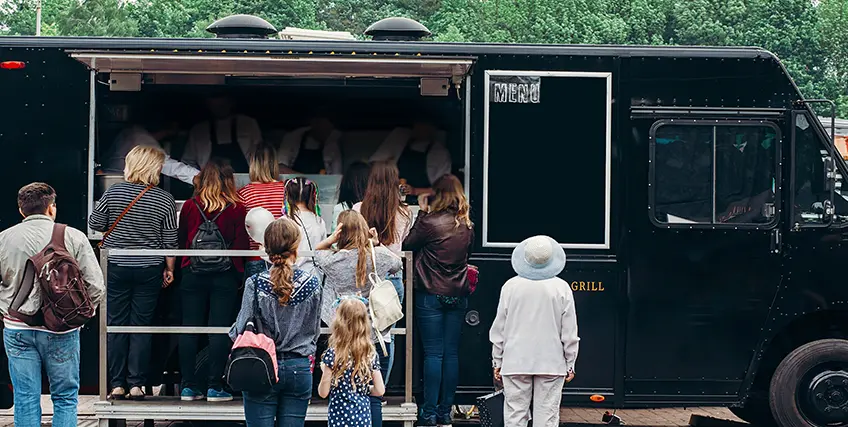Your Complete Guide to Starting a Food Truck Business and Getting Funded
April 04, 2025 | Last Updated on: April 07, 2025

Food trucks are gaining popularity among consumers, experienced chefs, and aspiring entrepreneurs. They cater to a wide variety of cuisines, ranging from inexpensive Thai street food to upscale French crepes. Becoming a food truck entrepreneur can be a good choice if you have a strong connection to your neighborhood, value versatility, and don’t have much money to put down a restaurant business. Food trucks offer a drastically cheaper alternative to starting a conventional restaurant, and aspiring restaurant owners often open physical locations once they have proof of concept. This step-by-step guide provides everything you need to know about opening a food truck business, including how much it costs to get started, how to get a business loan for a food truck, and how much you can make starting a food truck business.
How Much Money Is Needed to Start a Food Truck Business?
In order to start a business, you will need to price out startup costs in advance. This is a core component of any good business plan for food truck owners. Gather information on all startup costs of a food truck business, then include those revenues and expenses in your budget projections.
Here are some of the common food truck business expenses you'll need to consider, no matter which type of cuisine you'll focus on.
Vehicle
The vehicle or trailer will probably be the item with the highest price tag you buy. Prices may vary anywhere from $50,000 to $175,000, depending on the equipment, condition of the vehicle, and other modifications. While this may seem like a large investment, it is much lower than the cost of starting a physical restaurant, which can range from $175,000 to $750,000 or higher.
Food Truck Permits and Licenses
When starting a food truck business, you must have all the necessary permits and licenses to avoid trouble. The cost of these food truck licenses, including a business license from the city, health department inspections and a parking permit, varies from city to city and can be quite drastic. For instance, the essential permits and licenses for a food truck business in Boston are over $17,000. By comparison, the cost is around $600 in Indianapolis. This means that Boston is 29x more expensive than Indianapolis!
Equipment
Create a detailed inventory of the cooking equipment, refrigeration, and other components your vehicle will need and keep track of the associated costs. Your planned menu items should eventually inspire your list. Obviously, the kind of equipment you need in the truck will vary depending on what sorts of food you plan to make.
Remember to include everything, from knife sets and takeaway containers to countertop barbecues.
Point of Sale
You must invest in a dependable point of sale (POS) system to keep track of sales, accept credit cards, and gather customer data. There are many great POS systems on the market, including some that are designed specifically for food trucks and restaurants.
Do your research and choose one with the features you need. It is much easier to choose the right system for your food truck business from day one rather than migrating to a new system later on.
Truck Design and Modifications
Truck design will be a huge factor in enticing potential customers to come and try your food. People use visuals to make decisions, and an appealing truck exterior can make all the difference. There are many options for designing your truck.
You can either do this with a vinyl paint wrap, which is a little more costly but lasts for a longer period of time, or you can paint your vehicle. A high-quality vinyl wrap for your food truck typically costs around $2,500 to $5,000. However, your investment return could be huge with the right design.
Food, Drinks, and Supplies
Food and other consumables are variable expenses that change based on what you choose to serve and how many customers you have. Estimating the supply of each ingredient you will need is one of the hardest parts of any food operation. As you gain experience, your ability to forecast inventory will become more accurate.
Employees
Take some time to think about the staff size that will be required to operate your restaurant as well. You will have to consider compensation and any benefits you provide them. Ideally, you'll need to provide much of the early manpower when operating the food truck.
Over time, you will likely need at least a few employees to assist you as you get off the ground and running. For example, if you plan on being the chef, you will need someone to take orders and serve the food. Or, if you plan on handling that part of the equation, you’ll need a good chef to execute the recipes you have in mind.
Running a Food Truck Business
It is important to remember that during the setup process, a substantial amount of paperwork needs to be in place to ensure that you are operating legally. By completing all necessary documentation, acquiring the proper insurance, and abiding by local and state regulations and ordinances, you can ensure that your company complies with all applicable state and municipal regulations.
Insurance for a Food Truck Business
The owners of food trucks must have both general liability insurance for their companies and vehicle insurance for their vehicles. You’ll want to look carefully into different pricing options and coverage to find out what suits your needs. You may consider an insurance broker as part of this search to help you find the policy that matches your circumstances.
Food Truck Business Restrictions
Research the precise regulations that apply to food truck operators in your area. For instance, in Seattle, food trucks are prohibited from doing business within fifty feet of another restaurant unless they have permission from that restaurant.
Before you start operating, you must know all the local ordinances to ensure that your business operates in compliance. Otherwise, you could receive business-damaging fines.
Pre-Planning Tips and Tricks
Starting a food truck business is not that much different from starting a brick-and-mortar restaurant (except for the substantial reduction in startup costs). There are many areas to take care of, including business financing, food services, food options, business ideas, and food safety.
Do market research
Learn about your target market to determine what it loves (and doesn’t like) and how you might approach them to sell your products or services. What sort of cuisine is popular right now in your city? Alternatively, what cuisine is not offered yet or that people would enjoy? Think about how your food truck concept would fit into this market. What niche would it be servicing? Is there enough demand?
The next step is to investigate the competition in the region by looking into the other food trucks and restaurants in the same market as you. If other restaurants are in the same market as you, you should also check into them. If there is a glut of Italian restaurants and food trucks in your city, starting a food truck business specializing in Italian food may not prove successful. It will be challenging to differentiate yourself from the competition and drive business under such circumstances.
Create a marketing plan for your company
Your food truck business plan and business strategy will serve as the compass that guides your mobile kitchen. When you begin your new company, having a written record and food truck marketing plan outlining your most important goals and objectives is helpful.
Financial projections will guide you toward revenue goals and keep you on track with expenses as you grow your food truck business. These documents will also highlight the methods you intend to use to achieve those short- and long-term goals.
Design a unique menu
Since space is at a premium inside a food truck business, your menu has to consist of just a few essential products that can be cooked in a constrained area. This means you will want to focus on unique items that are delicious and will set you apart from your competition.
The menu of a food truck is critical. Research the market to get feedback on your best recipes before starting your food truck business. Make sure your food truck makes a good first impression by offering the best quality food right at the beginning. It will be much harder to run a successful operation if you have to overhaul your menu one or more times after your launch.
Create a Marketing Strategy
Developing a good marketing strategy will be incredibly important. Can you attend local food fairs to spread the word and give out samples? Where can you post fliers? Do you already know where you plan to park your truck each day of the week to maximize foot traffic?
Indeed, particularly in the early days, marketing will be half the game in creating a successful food truck operation. Social media and online marketing will be critical, but don’t forget about local grassroots marketing. Word of mouth, physical advertisements, and more will be your bread and butter for spreading the word cheaply and efficiently.
What Financing Options Are Available?
Odds are you may need to obtain financing to start your food truck. Fortunately, there is a wide range of financing options available to individuals looking to get started, each with its own structure, terms, and conditions.
You may also like: Food truck financing, easy small business loans
Small Business Administration (SBA) Loans
Small Business Administration (SBA) loans are a great resource for individuals looking to start a small business. Because the federal government backs them, SBA loans are often easier for small businesses to obtain than traditional brick-and-mortar loans.
One of the advantages of the SBA is that they only allow lenders who meet their stringent qualifications to lend money through the program. This can give you added confidence that your loan will be from a quality lender.
While the SBA offers a wide array of loan options, SBA Microloans can be ideal for food truck startups. They offer borrowers up to $50,000 in funding and are often given to startup businesses looking for their first loan.
Business Term Loans
Term loans are another option that small businesses can consider when starting a food truck. A food truck business loan allows borrowers to borrow a lump sum and pay it off over time. These loans typically offer fixed interest rates and monthly payments.
Terms loans can be obtained from both brick-and-mortar banks (where qualifications and requirements will be stringent) or alternative lenders (where requirements will be significantly more relaxed, but interest rates may be higher). These are the most traditional of all loan types and are a common resource for startup businesses.
Business Lines of Credit
Newer, smaller enterprises often have a more difficult time gaining access to commercial lines of credit than companies with an established financial track record. However, this doesn’t mean they are unattainable.
Lines of credit give businesses a set amount of money they can draw from at any time. Once you repay what you've borrowed (plus the associated interest), you can draw money from the line again. This makes them a great option for quick and easy access to capital when needed.
Equipment Loans and Leases
Equipment loans are one of the best resources available for food trucks. With equipment loans, the equipment you are purchasing serves as collateral on the loan. This reduces the risk for lenders, as they know that even if you default, there will still be an asset that they can recover some of their money from.
Personal Loans
The vast majority of financial institutions, including banks and credit unions, offer personal loans. When determining whether or not to approve you for a personal loan, lenders look at your credit score and individual credit history.
You can often apply online with the banking institution of your choice. When compared to a loan for a small business, a personal loan used to establish a food truck may be simpler to get. However, the loan size will typically be much smaller, and there are risks associated with personal loans. In particular, if you default on the loan, you will be personally liable for it, which may put your assets at risk.
How Much Money Can You Make With a Food Truck Business?
Food Truck Empire reports that 34% of food trucks generate a gross revenue of between $100,000 and $150,000.
Conduct a break-even analysis to determine how much revenue you'll need to cover all of your expenses. It is important to pay strict attention to the costs of labor, meals, licenses, and any other continuous business expenses.
Financial analysis can evaluate your company’s sustainability, stability, and profitability over the long term.
The Bottom Line
When you start a food truck business, you'll need hard work, perseverance, and dedication. It’s not easy work, but this business guide provides a framework to create a successful business. Effective marketing and happy customers will grow revenues while keeping a close watch over expenses contributes to your profitability. If you don't have the money to open a food truck business, affordable financing options can help you launch or expand your business without busting your budget.
Frequently Asked Questions (FAQs)
How Profitable is a Food Truck?
The average food truck reaches profitability within the first 18 to 24 months. How quickly you'll break even and start turning a profit depends on your revenue and food costs.
Do You Need an LLC to Run a Food Truck?
No, you do not need an LLC or corporation to operate a food truck. Many food truck business owners start out as sole proprietors or partnerships, then formalize the business structure as the business grows. LLCs provide protection in case of a lawsuit, so if you don't incorporate, make sure you have adequate insurance to protect yourself.
What Is An Ideal Food Truck Business to Start?
There are numerous food truck business ideas that are profitable and successful. Focus on high-margin foods and popular dishes in your local area. Examples include hamburgers, coffee, barbecue, cupcakes, and grilled cheese.
How Many Food Trucks Fail?
Roughly 60% of food trucks are no longer in business after three years. This could be due to business failures or changing consumer tastes. Boost your food truck's success rate by keeping your costs low, constantly getting customer feedback, and tracking which items contribute most to your sales.
How Much Is Insurance For a Food Truck?
Having insurance for your food truck is essential to protecting yourself and your customers. The average cost of food truck insurance ranges between $2,000 to $4,000 annually. However, your actual premiums may vary based on location, previous claims, limits and deductions, and which carrier you choose.




